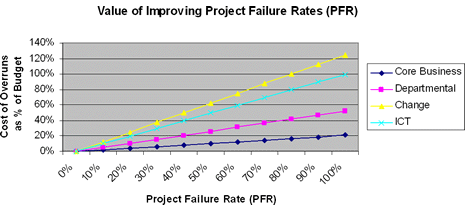Our success rate
With a proven success rate in excess of 80% we gladly nail our colours to the mast.
In fact, in context of industry wide comparative data, we celebrate our sustained success rate as an extraordinary achievement.
Compared to the industry average success rate of around 30%*, we are up to three times as successful as our competitors and the industry at large.
In other words: Caravel’s success rate exceeds industry standards by 300%!
This comparison clearly has cost implications for projects.
Cost of success vs cost of failure
On average some 70%* of change projects fail to meet the delivery schedule, or cost or quality expectations.
As a result, projects are frequently delivered with limited functionality and/or cost and time overrun, or cancelled altogether.
The cost implications of these failure rates are especially severe for change projects

The cost penalty for project failure rates is especially high for change projects. Failing to meet the delivery schedule, cost or quality expectations has dire consequences e.g. 80% of budget at a failure rate of 70%
A 10% reduction in project failure rates roughly equates to 10% of the change budget project.
For a $300m project, this reduction in project failure therefore equates to a $30m saving with the addition of significant stakeholder value.
Caravel’s demonstrated success greatly reduces the risk that your project will be plagued by cost penalties and ensures it has the best possible chance of success.
NB: *footnote
A KPMI survey claimed that 86% of IT projects fell short of planned expectations (PMI Network, 2006)
Standish Group International reports 32% of all projects succeeding which are delivered on time, on budget, with required features and functions. (Standish Group Report, CHAOS Summary 2009)
|